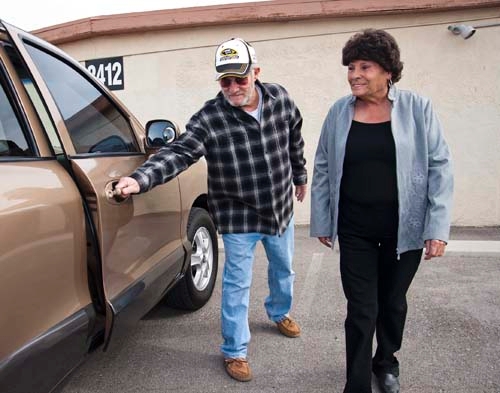Cancer patients thankful for volunteers on Road to Recovery
Olivia Baldonado remembers well the day five months ago when doctors told her she had lung cancer. It was the same day her younger sister shared in a long-distance phone call that she too had been diagnosed with cancer - colon cancer.
Olivia Baldonado cried. Her sister cried. They shared their worries, their fears, their hopes, their support for one another. Then they cried some more.
"All I do now is pray for everybody that has cancer. I know what they're going through," the 66-year-old widow, originally from Albuquerque, N.M., says as she awaits a volunteer driver for the American Cancer Society's Road to Recovery program. The program provides transportation to and from treatment for people who don't have a ride or can't drive themselves.
In the early stages of battling the insidious disease, the retired apartment cleaner requires extensive medical treatment - chemotherapy and radiation, primarily - five days per week. She has no car and depends upon the wholly volunteer Road to Recovery program to get her there.
"Doctors tell me I'm doing OK ... so far," Baldonado says with a smile that tapers off at the start of "so far."
A black bandana wraps her head to cover the humbling loss of hair that comes with the ongoing chemo treatments.
Moments later, the smile - one that seems to say, "I'm doing OK," never mind the "so far" - suddenly returns as a gold sport utility vehicle pulls into the parking space next to Baldonado's home off McCarran Street, and Ray Raymond bounces out.
One of the key components to beating cancer, experts will attest, is a positive attitude bolstered by emotional support. Family and friends usually fill that role, but support may not come in any more concentrated form than that of Raymond, a 5-foot-9-inch, scruffy-bearded, 22-year Air Force veteran, former sports referee and umpire and, fingers crossed, soon-to-be prostate cancer survivor.
Raymond puts an arm around Baldonado's shoulder, and suddenly it's as if cancer is just a six-letter word, not the four-letter word that torments so many people.
"How are you today?" he asks Baldonado, genuinely meaning the words.
Four days a week, pretty much every week, the 69-year-old Raymond ferries the scared and scarred all over the valley so that hopefully, like him, they too can begin the road to survival.
The Southern Nevada chapter of the Road to Recovery program has approximately 50 drivers, about 25 who shuttle cancer patients several times per week. Raymond is one of those 25, and this given week he is Baldonado's personal chauffeur - and cancer confidant.
"The transporting of these individuals is important, no question," local Cancer Society Qualify of Life manager Debra Armstrong says. "But the ability of these volunteer drivers to listen, that's just incredible.
"Many of these volunteer drivers are people who have had cancer or have someone in their families who have had cancer. They know where these patients are coming from. They want to give back. And they do, not just with their vehicles and time, but with their ability to listen.
"They're true angels."
With what Armstrong says are hundreds of cancer patients in the valley in need of transportation, the Road to Recovery program is in dire need of additional "angels." Her goal is to have 100 at the ready, whether it's ones like Raymond, who devote considerable time each week, or ones who can free themselves up for a couple of hours only, just one day per week.
"It's the worst," Armstrong says, to have to tell a patient who calls in for transportation that there are no drivers available. That happens frequently, more so during the holiday season when family commitments briefly supersede volunteerism.
In Baldonado's case, she has been lucky - more accurately, she has been blessed. Raymond has been there for her, as have other drivers with the names of Tom and Jim, and she has yet to miss a treatment.
"They're all beautiful and wonderful people," she says of the drivers.
Raymond is humble to a fault. His cancer appears to be in remission, as does the non-Hodgkins lymphoma of his wife; but speaking with him you get a sense that this work is much more than paying forward his collective good fortune.
"There's so much bad about cancer, but there is one good to it," Raymond says, as Baldonado excuses herself briefly to don a black wig she will wear to her appointment at the Comprehensive Cancer Center, six miles away on Eastern Avenue. "You learn to appreciate what's really important. The little, piddling things, they don't mean squat.
"What matters is taking care of each other."
Contact reporter Joe Hawk at jhawk@reviewjournal.com or 702-387-2912. Follow him on Twitter: @RJroadwarrior.
drivers wanted
Every week, hundreds of local cancer patients need a ride to a medical facility for treatment. To become a volunteer driver for the American Cancer Society's Road to Recovery program, you must:
■ Own a safe and reliable vehicle.
■ Have a valid driver's license.
■ Have proof of adequate vehicle insurance.
■ Have a good driving record.
■ Attend volunteer driver training.
■ Be prepared to make an average minimum commitment of four hours per week, however it works for your schedule.
■ Assume the costs of transportation, such as gasoline.
For more information or to volunteer, call 702-891-9023.
AMERICAN CANCER SOCIETY

















